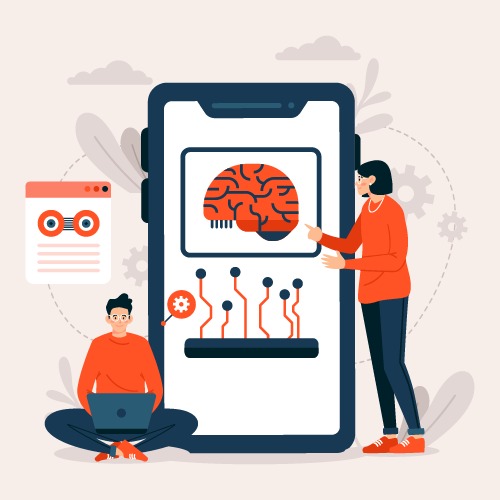Machine Learning has revolutionized the mobile app landscape and development process, optimizing iterations, enabling intelligent app creation, and enriching various facets of mobile app development. By incorporating machine learning into app development, it significantly enhances user perception of information/content and drives substantial profitability for app development companies.
As technology advances towards intelligent mobile-centric solutions, the proliferation of machine learning applications is transforming human lives. Additionally, machine learning application development empowers businesses to better understand their needs while facilitating faster app development for developers. According to reports, the global machine learning market is projected to experience a compound annual growth rate (CAGR) of 42.08% from 2018 to 2024.
The integration of machine learning in mobile app development
In this article, we will explore the advantages of integrating machine learning in app development from the developer’s standpoint, highlighting its impact on app agility, efficiency, and effectiveness. We will also delve into the various use cases of machine learning in different types of mobile applications, starting with how app developers can leverage this technology to create innovative and cutting-edge apps.
- Enhancing Fraud Detection
Detecting fraudulent activities in credit card and e-wallet transactions poses a constant challenge for banks and financial institutions. As online banking theft evolves, trust and security concerns grow, impacting both customers and businesses. To address this issue and streamline their workflows, businesses developing mobile apps should prioritize fraud detection. One effective solution is to integrate machine learning into the app development process. By learning transaction patterns over time, the app can determine whether a transaction is initiated by the genuine user or by someone else. If any suspicious activity is detected, the app promptly notifies the user, ensuring improved security measures. - Virtual Assistant
Machine learning opens up opportunities to create virtual assistants for mobile apps, enabling them to understand users’ needs and assist them in managing and organizing their work, leading to enhanced productivity—the primary objective of a virtual assistant.
By integrating machine learning technology into a mobile app, users can rely on an assistant that helps them remember tasks, schedule bill payments, make online bookings, perform online shopping, and more. Prominent examples of virtual assistants like Alexa, Siri, and Google Assistant minimize human intervention and improve overall efficiency. - Wireframe Development and Logic Automation
Machine learning application development proves valuable in creating wireframes for mobile apps by leveraging Big Data. App developers can utilize machine learning to conduct technical feasibility tests during the development phase with high speed and accuracy. Machine learning also automates logic development, alleviating the time-consuming task of covering various user input possibilities and outcomes. By recognizing patterns, machine learning enhances coding and streamlines the process. - Predictive Analysis
With brands embracing personalization and user-centric platforms, the integration of predictive analytics becomes essential. However, performing predictive analytics on a large and complex platform would typically require significant resources constantly working together. Machine learning, coupled with predictive analytics, enables faster and more accurate recommendations. By analyzing users’ past behavior and current needs, machine learning allows apps to process vast amounts of data and generate customizable predictions tailored to individual users’ preferences and requirements.
What Machine Learning Brings to Mobile Apps?
From its humble beginnings as a pattern recognition program, machine learning has evolved to perform various specific tasks. It powers advancements like self-driving cars and personalized recommendations in online shopping.
Machine learning modules are now trained to understand and respond intelligently. For example, if an email mentions the word “attachment” but no files are attached, the application will notify the users before sending, ensuring they are aware of the absence of attachments.
Now, let’s explore the significance of machine learning in mobile applications.
- Personalized User Experience
Machine learning algorithms analyze user information from social media platforms, leveraging their activities to create a personalized browsing experience. Users receive tailored recommendations and relevant content based on their preferences and social media engagement. Even promotional ads on social media are customized to align with user activities, enhancing personalization through machine learning technology.
- Enhanced Search Capabilities
In today’s data-driven world, efficient and effective search functionality is crucial for delivering a seamless user experience. Machine learning applications play a significant role in improving search capabilities. Integrated algorithms understand user queries and data, optimizing search results and reducing response time.
By utilizing behavioral and contextual data, search engines can determine the most relevant results to present to users.
- Assessment of Consumer Behavior
Marketers are increasingly focused on understanding consumer preferences with the advancements in Artificial Intelligence. Machine learning algorithms utilize user data, including age, gender, geography, search queries, and app usage, to assess behavioral patterns. This valuable data allows marketers to improve their strategies and conversion funnels, enhancing customer satisfaction and maintaining brand equity. Machine learning enables marketers to align their efforts with consumer choices, resulting in more effective marketing campaigns.
Utilizing Machine Learning in Various Mobile Applications
Machine learning techniques have found applications in a wide range of industries, empowering them in multiple ways. Let’s explore some areas where machine learning is making a significant impact.
- Data Mining
Data mining involves extracting valuable information from extensive datasets by analyzing data patterns. Machine learning algorithms play a crucial role in identifying connections and patterns within datasets. Consider a travel application as an example. Manual analysis of variations and customer behavior patterns is impractical for companies. To address this, they collect user data such as gender, age, app usage frequency, and travel history. Machine learning algorithms are then employed to gain valuable insights about the end-users, enabling companies to make informed decisions.
- Financial Sector
Machine learning has proven advantageous in the finance sector, facilitating cost reduction, service scalability, and improved customer experiences for businesses.
- Healthcare Industry
The healthcare industry has undergone a significant transformation due to the integration of machine learning technology. Machine learning’s value in healthcare lies in its capacity to process and analyze extensive datasets that surpass human capabilities. Through this analysis, medical professionals gain clinical insights that aid in improved healthcare planning and delivery.
Furthermore, machine learning is also incorporated into various mHealth apps, empowering users to track their health and access necessary solutions. Fitness tracking apps, for instance, excel in enhancing users’ lifestyles by analyzing daily activities such as step count and calorie burn.
In conclusion, as machine learning continues to advance, the future generation of mobile apps will become even more robust and user-oriented. The technology has already been implemented successfully, and an increasing number of app development companies are embracing machine learning to harness its advantages.
By utilizing machine learning, apps can be customized according to users’ preferences, while also providing a fast, efficient, and secure environment.
Thank you for reading. For continued insights and in-depth discussions, please follow our blogs at Ezeiatech.







